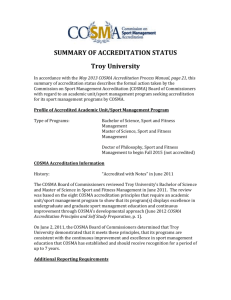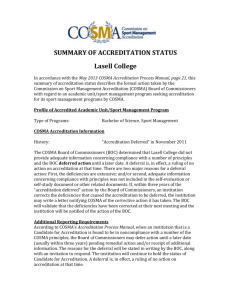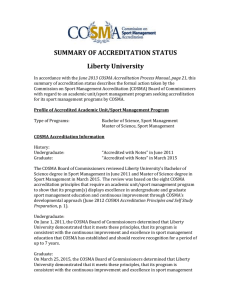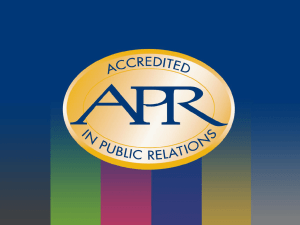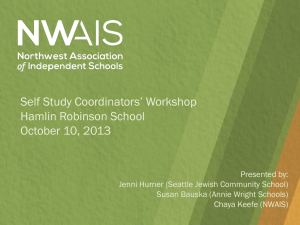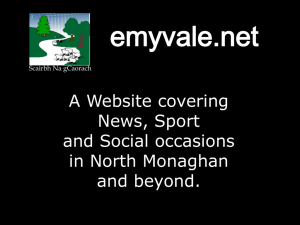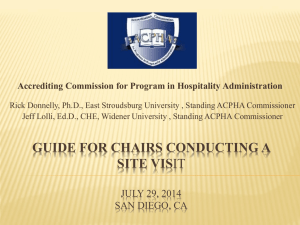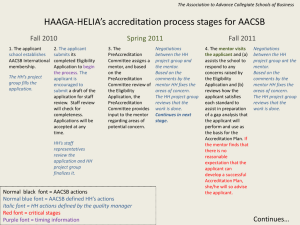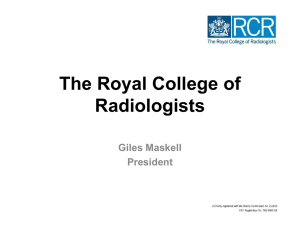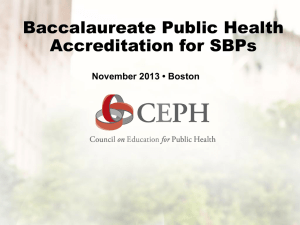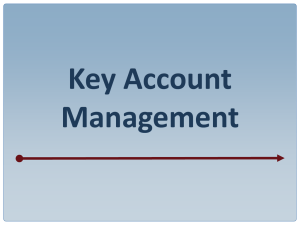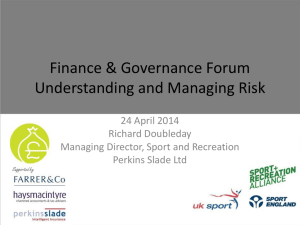Site Reviewer Training
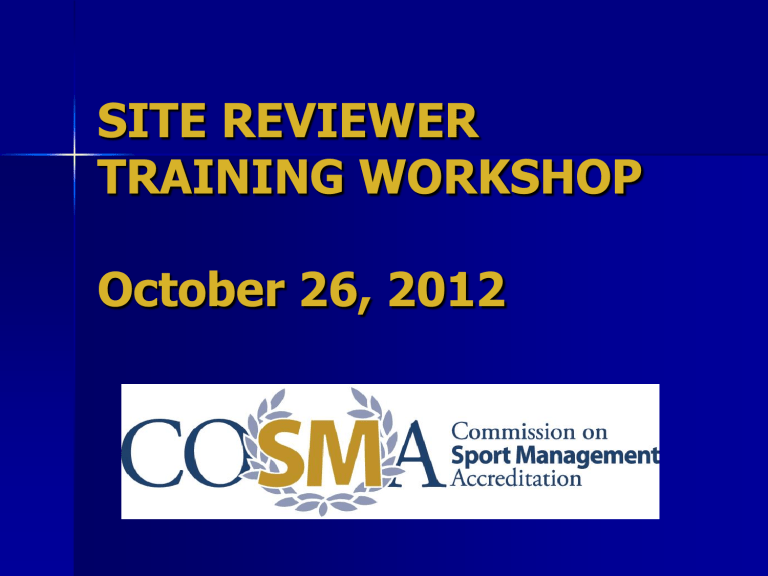
SITE REVIEWER
TRAINING WORKSHOP
October 26, 2012
Philosophy of the COSMA
Accreditation Model
Outcomes based/Mission driven
Accreditation principles based on best practices in SM education
Developmental – annual reporting focused on continuous improvement
Flexible – accommodates various institutional models and innovative approaches
Benefits of
Accreditation
Free training, assistance
Best practices - templates, rubrics
External accountability
Enhanced reputation
External assurance of quality
Effective mechanism for continuous improvement
Mechanism for program advocacy
Scope of Accreditation
Includes both undergrad and graduate programs
Academic unit should be an identifiable entity and led by a doctorally- or professionally-qualified educator
Includes off-campus locations
All programs included even if through cooperative or interdisciplinary arrangements
All modes of delivery should be included (online, distance learning, adult degree, accelerated)
In Annual Report, programs notify COSMA if a new program is being added
Scope of Accreditation, con’t
Definition of “Program” – track, minor, concentration
•
Within sport management degree, include all tracks
•
“Tracks” outside sport management degree (e.g., physical education), include sport management track
Program must provide rationale for what is included and what is not included in accreditation process
If a program “appears” to be accredited by
COSMA, it must be included in the accreditation process or the program must provide rationale for why it’s not included
Steps to Accreditation
1)
2)
3)
4)
5)
6)
7)
Membership application & fee
Attain Candidacy Status (CS)
Collect data and begin writing Self Study
Establish timeline for site visit
Complete Self Study (at least 90 days prior to site visit)
Site visit (2 days)
Decision by Board of Commissioners
(November/May-June of each year)
Quiz #1
Experience with Other
Accrediting Bodies?
Becoming a Site Reviewer
COSMA individual/institutional membership
Submit an electronic CV
Attend a training workshop
Be familiar with COSMA principles, policies & procedures
Time commitment: 2 days, preparation and follow-up
Site Visit Assignments
Schedule visits 3-6 months in advance
COSMA staff, BOC assigns two person team as early as possible
Conditions
Avoid conflicts of interest
Balance and representation
Costs
Honoraria and Travel
Reimbursement
Institution responsible for paying all costs:
Honoraria - $300/day for team chair;
$200/day for team member
Travel
Hotel
Meals
Miscellaneous costs (e.g. travel to and from home airport)
Site Team Responsibilities
Prior to visit: 1) Review self study at least twice 2) Discuss preliminary impressions by phone 3) Request additional materials, as needed 4) Modify site visit agenda, as needed
On-site: 1) Meet night before 2) Stick to agenda and remain on time 3) Validate self-study materials 4) Write detailed report
Post-visit: 1) Write summary report
Team Chair Role &
Responsibilities
Designated by COSMA staff, BOC
Served on at least two other site teams
Or, is a past member of the COSMA BOC
Coordinates visit details with the institution
Review and modify site visit agenda
Responsible for completing a thorough and objective site visit
Submits the completed site team report
Campus Coordinator Role
Person responsible for accreditation process
(not necessarily the department chair)
Helps team make travel plans, including transport to and from their hotel to your campus
Develops site visit schedule
Makes sure site visit stays on schedule
Organizes on campus meeting room for team
Site Visit
Preparation/Reviewing the
Self Study
Review all self-study materials and note questions, concerns
Communicate with the other team member about initial findings, concerns
Make necessary travel arrangements
Phone training with COSMA Executive
Director
Develop questions to ask on site
Pre-Visit Meeting
Arrive the evening before the visit
Site Team Meeting
Re-familiarize yourself with self-study materials
Discuss the schedule for the visit – who leads which interviews
Plan opening session and exit interview with
Department Chair, On-site Coordinator, etc.
Discuss report writing process
Determine if any additional materials are needed
Sample Site Visit
Schedule: Day 1
Schedule
8:00 am Meet with dept. head to discuss two day visit
9:00 am Meet with President and/or Chief Academic Officer
9:30 am
Meet with Outcomes Assessment Coordinator to review institutional plan
10:30 am Review Sport Management O/A plan with dept. head
Noon Lunch with faculty (no administrators present)
1:30 pm
6pm
Work time for site team & dept. head to validate selfstudy and ask questions (3 - 4 hours)
Dinner
Sample Site Visit
Schedule: Day 2
Schedule
8:00 am Meet with students majoring in sport management
9:00 am
Tour facilities (library, classrooms, computer labs, etc.)
10:30 am Exit interview with dept. head (and others, if desired)
Noon
1:30 pm
Lunch meeting with Advisory Board (or other parties)
Site team works on draft report/time for unexpected issues
3:00 pm Site team departs from campus
Self Study Organization
Volume 1
Title Page
Table of Contents
Background information
Documentation of Accreditation Principles
Volume 2 - Appendices
Catalog (online URL okay)
Abbreviated Syllabi
Faculty CVs (full- and part-time)
Outcomes Assessment Plan, Results, and Actions
Strategic Plan
Faculty Handbook (can be separate document)
Eight Principles of Accreditation
Outcomes Assessment
Strategic Planning
Curriculum
Faculty
Scholarly & Professional Activities
Resources
Internal & External Relationships
Educational Innovation
Principle 1: Outcomes
Assessment
Assess Key Content Areas:
Program assessment
Clear and measurable student learning outcomes
Direct and indirect measures of student learning
Basic Skills - undergraduate and graduate
Personal development of students
Operational effectiveness (and measurements)
Integration into future budgeting and planning
Review measurement instruments and rubrics
Review reported results
Note changes and improvements – Action Plan
Quiz #2
Which of the following are direct measures of student learning?
1.Capstone course project
2.E-portfolio
3.Comprehensive exam
4.Internship supervisor evaluation
Direct Measures of Student
Learning
Demonstrate direct evidence of student learning:
• Comprehensive exams
• Standardized national exams
• Pretest and posttest assessments
• Required structured internship
• Portfolios (electronic or traditional)
• Capstone project assessment
• Thesis/Dissertation
• External certification program (e.g., NSSE)
Indirect Measures of Student
Learning
Ask students (or others) about their learning:
• Graduate survey
• Alumni survey
• Employer/internship supervisor survey
• Exit interview
• Advisory Boards
• Student focus groups
• Anecdotal evidence
“Closing the Loop”
Institutional
Goals
Student
Learning
Outcomes
Benchmark Measurement
Tool
Communicate effectively both orally and written.
Comprehension and application of professional written and oral communication business skills.
80% of the students meet proficiency standards in writing measured using writing rubric
Written assignments in BU210 and BU404
Results Action Plan
85.6% of the student in
BU210 &
BU404 met the standard
Continue to record scores for writing evaluation the these two courses.
Discuss the possibility of a standardized test in the core courses to meet this competency
Principle 2: Strategic
Planning
1. Profile of sport management program
2. Description, assessment of resources
3. External analysis – beyond COSMA site visit
4. SWOT analysis
5. Student learning objectives, strategies, actions plans, and O/A processes
6. Operational objectives, strategies, action plans, and O/A processes
Principle 3: Curriculum
3.1 Program Design
3.2 Common Professional Component
3.3 General Education
3.4 Breadth and Depth of Curriculum
3.5 Curriculum Review and Improvement
3.6 Master’s Degree Curriculum
3.7 Doctoral Curriculum
3.2: Common Professional
Component (CPC)
A) Social, psychological and international foundations of sport
E) Finance/Accounting/
Economics
1. Sport finance
2. Accounting
B) Management
3. Economics of sport
1. Sport mgmt principles
F) Legal aspects of sport
2. Sport leadership
3. Operations mgmt/event & venue mgmt
G) Integrative experience:
1. Strategic mgmt/policy
4. Sport governance 2. Internship
C) Ethics 3. Capstone experience
D) Sport marketing & communications
CPC Table
Quiz #3
Common Professional
Component
Principle 4: Faculty
4.1 Faculty Qualifications
4.2 Faculty Load
4.3 Program Coverage
4.4 Faculty Evaluation
4.5 Faculty Development
4.6 Faculty Policies
4.1: Faculty Qualifications
Doctorally qualified:
1.
Holds Ph.D. in SM or related field
2.
3.
Holds J.D. and teaches in legal environment of SM
Holds out-of-field doctorate, with sufficient combination of graduate work, professional experience, scholarly achievements, and successful teaching experience
Professionally qualified:
1.
Be A.B.D.
2.
3.
Hold Master’s degree in SM field and five years teaching experience
Hold Master’s degree in SM-related field with post-graduate training in areas of teaching responsibility
Minimally qualified:
1. Master’s degree in field appropriate to teaching responsibilities
4.1: Faculty Qualifications, con’t
1) Identify the credentials of all full- and part-time faculty members
2) Review current vitae for all SM faculty (in
Appendix)
3) Review and validate all tables related to Faculty
Coverage and Load
Quiz#4
What are the minimum number of faculty needed for a program?
Principle 5: Scholarly and
Professional Activities
Scholarship of:
Teaching
Discovery
Integration
Application
Professional activities include: consulting, seminars, workshops, professional organizations
Principle 6: Resources
6.1 Financial Resources
6.2 Facilities
6.3 Learning Resources
6.4 Educational Technology and Support
6.5 Off-Campus Locations
Principle 7: Internal and
External Relationships
7.1 Internal Relationships
7.2 Admissions Processes
7.3 External Oversight
7.4 Business/Industry Linkages
7.5 External Cooperative Relationships
7.6 International Cooperation
7.7 Diversity in Sport
7.8 External Accountability
Quiz #5
Are internships required by COSMA?
a) Yes b) No c) Only for big institutions d) Only if you have enough faculty
Principle 8: Educational
Innovation
Evaluate the institution's support for innovation
Evaluate the process in the program for encouraging educational innovation
Review recent examples, including improvements
On-site Materials
Course syllabi
Institutional catalog
Copy of last regional accreditation self-study report and findings
Faculty member vitae
Faculty handbook
O/A Plan
Summary of realized outcomes
Exit Interview
Who? Up to the department to determine – usually the campus coordinator, chair, and faculty
Review program strengths
Review areas that partially meet the principles
Review areas that do not meet the principles
Answer questions, but do not comment on accreditation status
Make suggestions for how the program can remedy deficient areas
Encourage the campus coordinator to talk to COSMA
Site Visit Report: Putting
Your Findings in Writing
History of institution, program, degrees, special considerations, thank yous.
Use checklist to help you write and the report template
Summary statement: what is your overall impression of the program in this area/principle?
Strengths: What does the program do well?
Areas of partial compliance: In what ways does the program not meet the principle?
Link principles together, as they are related
Do’s and Don’t’s
Do
Validate the self study
Provide examples to illustrate your point
Don’t
Express opinions
“Champion” an issue
Call Heather when in doubt
Use tact and diplomacy in exit interview
“Guess” at answers
Indicate whether the institution will be accredited or not
Your Role After the Site Visit
Team chair submits final report within TWO WEEKS
Submit expenses not directly covered by program to
COSMA
Keep all notes and materials until BOC meets and makes an accreditation decision – may be questions
Maintain confidentiality: Do not share your findings, materials, or opinions about the program or the site visit process with anyone
Submit evaluation of the site visit process and of your team member
Evaluation of the Site
Team’s Visit
Fill out and submit evaluation of your experience
Site team members evaluate each other
All comments kept confidential
Questions include:
Professional behavior of the team
Anything overlooked by the team
Strengths and/or limitations of any team member
What COSMA Does After the Site Visit
Institution receives letter summarizing visit
May include request for additional information
All materials sent to one member of Board of
Commissioners – self-study, site visit team report, any additional information
Commissioner reviews materials and prepares detailed report to present at next Board meeting
Accreditation Decision
Accredited with Notes
Accredited with Observations
Accreditation Deferred
Accreditation Denied
Conclusions
In today’s training you learned about:
• The COSMA accreditation process
• How site visit teams are chosen and how site visits are coordinated
• The expectations, responsibilities, and roles of the two members of the site visit team
• How to interpret each Principle of accreditation
• How to conduct the exit interview
• What to write in your final report
• The final steps in the accreditation process
• The role of the Executive Director and the Board of
Commissioners
Upcoming
Training/Events
• Accreditation Process Training @AAHPERD
National Convention – date TBD
• COSMA @Sport Management Day (4/24)
• Site Reviewer Training by Webinar – date
TBD
• Fourth Annual Member Meeting –
@NASSM, Austin, TX (5/29 – lunchtime)
